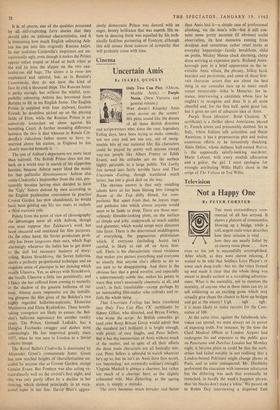Cinema
Uncertain Amis
By ISABEL QUIGLY
Only Two Can Play, (Odeon, Marble Arch.) — Purple Noon. (New Victoria and general release.) WHY doesn't Kingsley Amis come across on the screen? His plots sound like the dream of all those British directors and script-writers who, since the rosy, legendary 'Ealing days, have been trying to make comedy, not too cosy and not too coy, out of recog- nisable bits of our national life; his characters could be played by pretty well anyone except .
way-out people like Albert Finney or Edith Evans; and his attitudes are on the surface highly palatable to a large public. Yet Lucky fun turned into fairly terrible farce and That Uncertain .Feeling, though translated much better, has lost a good deal on the way.
The obvious answer is that only middling talents have so far been filming him (imagine Room at the Top dully filmed, for com- parison). But apart from that, he leaves traps and potholes into which almost anyone would seem to be liable to drop. There are those mar- vellously filmable-looking plots, on the surface so simple and jolly, underneath so much subtler and glummer, which would tempt most directors into farce. There is the determined middlingness of everything, the pugnacious philistinism which, if everyone (including Amis) isn't careful, is likely to rub off on Amis him- self. There is his characteristic visual vividness that makes you picture everything and everyone so exactly that anyone else's efforts to do so are sure to be disappointing. And there is the obvious fact that a good novelist, and especially a subterraneanly subtle one, makes his points in ways that aren't necessarily cinematic at all, and aren't, in fact, translatable—except perhaps by an outstanding film-maker who rethinks and re- feels the whole thing.
That Uncertain Feeling has been translated into Only Two Can Play ('X' certificate) by Sidney Gilliat, who directed, and Bryan Forbes, who wrote the script. As British comedies go (and even Keep Britain Great would admit that the standard isn't brilliant) it is bright enough, with plenty of easy laughs, and Peter Sellers. But it has the mannerisms of Amis without much of the matter, and in spite of all their efforts the three main characters ,are all basically mis- cast. Peter Sellers is splendid to watch whatever he's up to, but he isn't an Amis hero (too secret, too Interesting,' not outwardly ordinary enough). Virginia Maskell is always a charmer, but rather too much of a charmer here, as the slightly exhausted wife. Mai Zetterling, as the ageing siren, is simply a mistake.
The story becomes much broader and flatter than Amis had it—a simple case of professional climbing, via the boss's wife—but it still con- tains some pretty accurate (if obvious) social observation, its best moments coming from deadpan and sometimes rather cruel looks at everyday happenings—family breakfasts, child on pottie, Mickey Mouse clock alarming, cheap dress arriving at expensive party. Richard Atten- borough puts in a brief appearance as the in- evitable Amis villain, the phoney, folksy bard, bearded and portentous, and some of those first- rate character actors that are about the best thing in our comedies turn up to make small scenes memorable—John le Mesurier, for in- stance, interviewing a candidate whose face he oughtn't to recognise and does. It is all quite cheerful and, for the first half, quite good fun, but it gives no sort of adequate idea of Amis.
Purple Noon (director: Rene Clement; 'X' certificate) is a thriller about Americans, played b} French actors and presumably dubbed. Set in Italy, where Italians talk actentless and fluent American, it has a preposterous plot and makes enormous efforts to be inventively shocking. Alain Delon, whose dullness half-ruined Rocco, the supposedly saintly-looking murderer; Marie Laforet, with every modish affectation and a guitar, the girl. I must apologise for wrongly attributing Willis Hall's share in the script of The Valiant to Ted Willis.


































 Previous page
Previous page